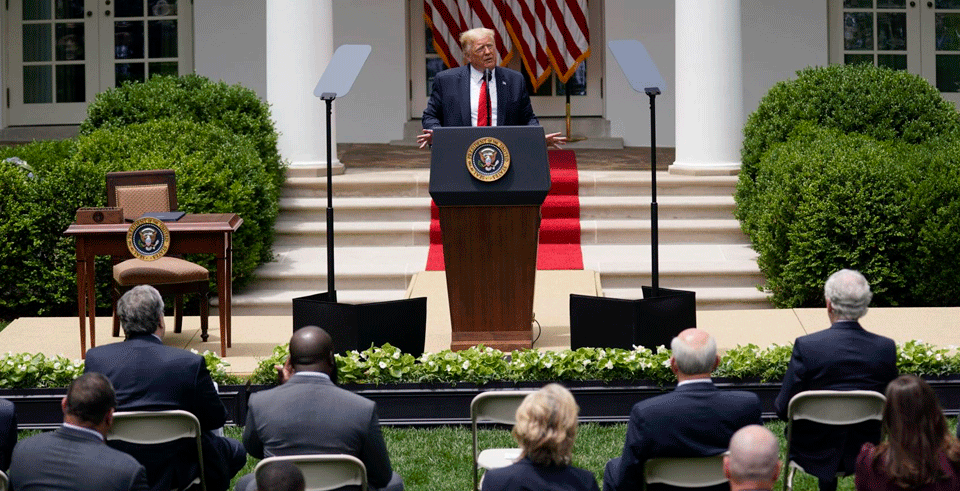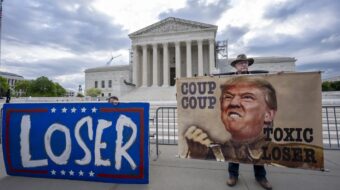
WASHINGTON—When it comes to dismantling the systematic racism of the nation’s police – which is part of the larger 401-year-old legacy of racism and white supremacy nationwide – the nation has a long way to go, and GOP President Donald Trump doesn’t get it at all, critics say.
And that’s despite Trump’s executive order on the subject, issued June 16.
“Reducing crime and raising standards are not opposite goals,” Trump said, flanked by uniformed police in a Rose Garden dog-and-pony show. “They are not mutually exclusive.” Almost immediately, though, Trump repeated longtime racist “law ‘n order” dog whistles.
He also repeated the GOP’s frequent claim that a few bad apples among the nation’s thousands of law enforcement officers are responsible for police violence and murder of unarmed civilians – and not a system that militarizes the police and empowers them to shoot first and ask questions later, if at all.
So Trump’s executive order includes unspecified incentives for better police training in community relations – training used before but then countered by veteran-set-in-their-ways cops on the beat. Trump also called for raising use of force standards, but was not specific. He was silent on no-knock warrants.
His order would ban police chokeholds on those arrested, such as the chokehold New York officer Daniel Pantaleo used on Eric Garner of Staten Island six years ago. “I can’t breathe,” Garner kept gasping before he died. So said George Floyd, killed by Minneapolis officer Derek Chauvin’s fatal knee to the neck on May 25. Trump’s order solves nothing because it does not provide for penalties for cops who violate the order.
Floyd’s death set off the nationwide peaceful protests ever since against the racist legacy of both the cops and the country. Trump scored the protesters and didn’t mention Floyd.
Trump also wants to establish a national database of police officers whose records include excessive use of force, presumably to alert other police departments against hiring them after employers can them. But in an indication of how weak that could be, there were 18 prior excessive-force claims against Chauvin, who was never disciplined.
As the critics note, almost all complaints about police brutality and violence result in no discipline at all – and individual complaints don’t get at the systemic problem anyway. That led Rep. Bonnie Watson Coleman, D-N.J., a Congressional Black Caucus member, to sum up Trump’s order in a tweet just afterwards. “We know what we need, and this isn’t it,” she said.
“To have a chance at changing the systemic issues in police departments nationwide, we need to eliminate qualified immunity,” a legal concept that prevents police from being individually sued, Coleman added.
“We need to change the standards for use of force, we need to eliminate no-knock warrants, and we need measures that promote transparency and accountability.”
Coleman also came right out and doubted Trump’s motives. “To spend weeks calling for military incursions in our cities on peaceful demonstrations” against Floyd’s murder and against racism, “to violently clear out protesters for a photo-op, and use the kind of incendiary rhetoric Trump has used should tell you everything you need to know about the intention of this move,” her other tweet said.
Others, on and off Capitol Hill, sang the same song. Pro-police groups laid low, with the largest association for cops, the Federation of Police, saying it was working with congressional Democrats – and even more closely with Trump and the GOP.
“America has a serious and deadly problem when it comes to the discriminatory and excessive policing of communities of color – and that policing exists within a system that time and again refuses to hold police accountable for their brutality,” Sen. Cory Booker, D-N.J., said several days before.
“For too long, this has been accepted as a cruel reality of being black in this country. We are forced to figure out how to keep ourselves safe from law enforcement and we are viewed as a threat to be protected against instead of people worth protecting.”
“We have seen the deadly consequences” of qualified immunity for police officers “play out on the streets, and Black Americans have largely paid the price,” ACLU National Legal Director David Cole said. His group tried to get the U.S. Supreme Court to take two cases on that issue. On June 16, the justices punted, refusing to hear them.
“Recent events demonstrate the urgent need for Congress to stand up for the rule of law and abolish qualified immunity — for anyone acting under color of law — to close the loophole allowing government officials to escape accountability for violating constitutional rights,” Cole added.
“The National Lawyers Guild recognizes the brunt of police violence is aimed at Black, Brown, Trans, gender non-conforming people, and that police killing people is a public health pandemic,” it said as part of a statement about another issue. The NLG supports defunding the police in favor of other services to both help troubled potential victims and to prevent police repression and murders before they occur.
“For more than 400 years, black Americans have been targeted and murdered in cold blood simply for being black. In the 17th century, slaves and free black Americans alike were under constant surveillance to ‘detect, prevent, investigate, and prosecute black alleged misconduct,’ according to a brief published by the American Constitution Society,” said Diallo Brooks, director of public outreach for People For The American Way.
Trump also set up a straw man by pinning “defund the police” calls on Democrats. The real calls are for shifting money from police to mental health and social services budgets that can prevent or de-escalate fatal policing of civilians in the first place. Meanwhile, and unlike Trump, House Speaker Nancy Pelosi, D-Calif., turned over drafting of the party’s Justice In Policing Act to the CBC, which unveiled it on June 4. A vote is expected by next week.
Senate Majority Leader Mitch McConnell, R-Ky., turned the task there over to Sen. Tim Scott, R-S.C., the sole Republican African-American. But McConnell will control what eventually comes up.

MOST POPULAR TODAY

‘Warning! This product supports genocide’: Michigan group aims to educate consumers

“Trail of Tears Walk” commemorates Native Americans’ forced removal

After months of denial, U.S. admits to running Ukraine biolabs

Ohio: Franklin County treasurer attends Netanyahu meeting, steps up Israel Bond purchases

Hold the communism, please: SFMOMA’s Diego Rivera exhibit downplays artist’s radical politics






Comments